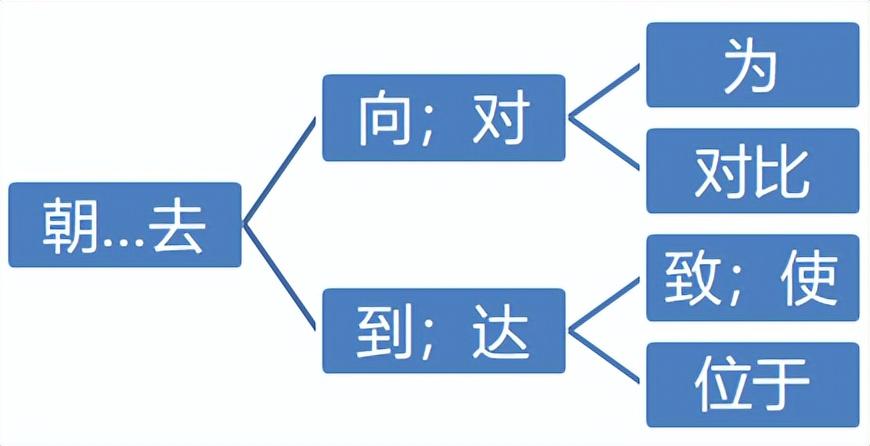英语单词对应汉语往往不只一个意思,尤其是常用的单词,含义和用法可能会很多,而且有的貌似还没有关联。泛解单词系列,本人用“核心义——引申义”的思路去诠释常用单词,尽量不用意译的方式翻译语句,采用直译的方式更容易理解和掌握单词的含义和用法。
to的核心含义:“朝…去”
It was on the way to the station. 那是在路上,朝火车站去的。
He's going to Paris. 他要去,朝着巴黎(去)。
He pointed to something on the opposite bank. 他指,朝着对岸的某样东西去。
由“朝…去”可以引申出“向;对”
I'll explain to you where everything goes. 我会向你解释所有东西的摆放位置。
He left the stage to prolonged applause. 他走下舞台,向经久不息的掌声(走去)。
I am deeply grateful to my parents. 我深深感激,对我的父母。
What have you done to your hair? 你做了什么,对你的头发?
It was a threat to world peace. 这是个威胁,对世界和平。
His music isn't really to my taste. 他的音乐不是,对我的口味。
由“向;对”可以引申出表示目的的“为”
Let's drink to Julia and her new job. 让我们干杯,为朱莉娅和她的新工作。
People rushed to her rescue and picked her up. 人们冲,为她的救援,并把她救起。
the key to the door(这个门的钥匙)和the solution to this problem(解决这个问题的办法)也可以归结到这个意思上来。这两个“的“不能用of,是因为钥匙不是门的一部分,办法也不是问题的一部分。
由“向;对”还可以引申出“对比”之意
I prefer walking to climbing. 我更喜欢散步,对比爬山。
The industry today is nothing to what it once was. 这一行业的现状微不足道,对比昔日。
We won by six goals to three. 我们获胜,以六比三。
由“朝…去”可以引申出“到;达”
Her hair fell to her waist. 她的长发下垂,到腰部。
Place the cursor to the left of the first word. 放光标,到第一个单词的左边。
The vegetables were cooked to perfection. 这些蔬菜被炒,到正好。
He tore the letter to pieces. 他撕那封信,到碎片。
His expression changed from amazement to joy. 他的表情变化,从惊到喜。
I'd say he was 25 to 30 years old. 我猜他在25到30岁(之间)。
It's five to ten. 现在(还有)五分钟,到十点。
He gave it to his sister. 他给那个,到他的妹妹。
She's married to an Italian. 她嫁,到一个意大利人。
There are 2.54 centimetres to an inch. 有2.54 厘米,到一英寸。(一英寸等于 2.54 厘米)
由“到;达”可以引申出“致;使”
To her astonishment, he smiled. 使她惊讶(的是),他笑了。
由“到;达”可以引申出“位于(不相连)”
Japan is to the east of China. 日本位于中国的东面。
There are mountains to the north. 有山,在北方。

以上是to的介词用法,如果在它后面放上动词原形,就构成了非谓语动词中的不定式。
不定式所能表达的含义与to的介词含义是紧密相关的。
I am going to tell you a story. 我将去,(朝)给你们讲一个故事(去)。
She was determined to do well. 她下定决心,(朝)做好(去)。
I don't know what to say. 我不知道,(去)说什么。
To be honest with you, I don't remember what he said. 对你以诚相待吧,我不记得他说的话了。
She managed to escape. 她设法,(到达)逃走。
It was too hot to go out. 天太热,(对于)出去来说。(天太热以至于不能出去)
I'm sorry to hear that. 我很难过,(为)听到这消息。
I reached the station only to find that my train had already left. 我到车站,仅仅(达到)发现我要搭乘的火车已经开走了。
You are not to talk during the exam. 考试期间你们不(去)说话。(考试期间不许说话)



